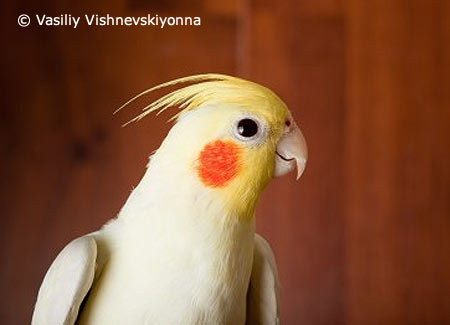Reasons Why Cockatiels Bite

Below are common reasons why a pet cockatiel may bite. Simply click on the biting topic below for more information. If you cannot determine why your cockatiel is biting with the information provided , please post your question on our parrot forum under the cockatiel section or head on over to our main cockatiel area.
- Reasons Why Cockatiels Bite
- Fearful Biting from a Cockatiel
- A Cockatiel Biting Out of Jealousy
- Cockatiel Territorial Biting
- Juvenile Biting in Cockatiels
- Reinforcement of Biting Unintentionally in Cockatiels
Reasons Why Cockatiels Bite
A pet cockatiel will bite for many reasons and it is usually different for each bird. Though the exact reason why the bird is biting might take some time to resolve, there is a standard way to determine the possible cause and how to best eliminate this negative behavior in a cockatiel. Once the owner has determined the cause, usually by recording the biting instances and looking for behavior patterns, the owner can then begin to apply a best-approach solution. It is important that the owner understand which approach is best.
If the right approach has not
been accurately identified, it can cause the bird to continue the
negative behavior, or worse yet, can possibly accelerate it. That is why
it’s highly emphasized that an owner log down the bird’s biting
instances and look to see if a pattern develops before applying an
approach. In order to effectively remedy a bird’s biting problem, this
is extremely important.
Biting is a way that a cockatiel communicates. These birds usually are
biting because they are trying to get a point across. For example, if an
owner reaches into the cage of their pet cockatiel and the bird strikes
and bites, the owner will most likely remove their hand from their
cockatiel’s cage and cease interaction with the pet bird altogether.
Over time, this repetitive pattern will condition the cockatiel to bite
because it has learned that biting is a way to control their owners and
the situation; all the more reason for an owner to be aware and
understand when a bird is agitated and doesn’t want to be handled.
Another reason why a cockatiel may bite is because it has not been
tamed. Most untamed cockatiels bite out of fear because they believe
their life is in danger. If an owner is dealing with an untamed bird, it
is important to work towards taming the cockatiel to minimize biting and
also to better handle the bird as a pet. More importantly, the owner
should develop time slots to hold and spend time with their bird as
these animals need this type of interaction to become more social and
not be scared of their owners, thus eliminating biting situations. Bird
interaction should be part of a daily routine for an owner of a
cockatiel.
It is important to note that cockatiels very rarely use biting in the
wild because this is considered an aggressive behavior. Usually biting
is reserved for threatening situations. In most instances, birds in the
wild will only have quick scuffles and the losing bird then flies away.
In fact, most wild birds expend their energy is finding food and little
effort is put into fighting. In the wild, birds usually show aggression
mostly during times when protecting their nesting sites from intruders
or when trying to protect their mates due to distrust of other
cockatiels.
Because captive cockatiels have been forced to adapt to our ways of
living, they have also begun to modify their behaviors to coexist.
Unfortunately, biting is a learned adaptation of being kept in
captivity. Cockatiels who bite excessively are usually those who have
not been well socialized, have been unintentionally reinforced to bite,
and do not understand the “flock dynamics” (house hold rules). For this
reason, the bird needs to be reconditioned and household rules taught.
Although difficult as it may be, when bird biting is excessive, the
owner should always ignore this behavior until a solution to eliminate
this conduct can be identified. Many times owners yell at their birds
not to bite but remember that this is counterproductive. This yelling
tells the bird that he has gotten your attention and will in fact make
the bird want to continue to bite because in his world he has
communicated with his owner. If the owner
should get bitten, they should continue to hold the bird as if nothing
has happened. Although, it is uncomfortable and may hurt when getting
bitten by a pet bird, the owner’s overall goal should be to show the
bird that biting is not an effective way to communicate. Eventually the
bird will catch on and the biting will be minimized.




